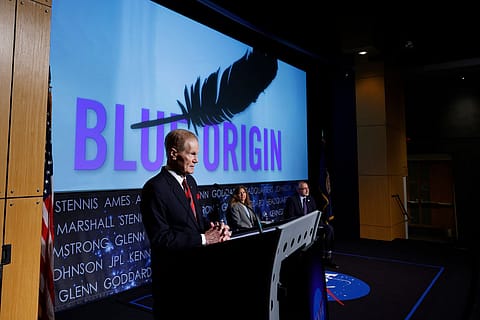SERA names India as partner nation for Blue Origin space flight
The programme is being executed in collaboration with Jeff Bezos’ Blue Origin particularly with citizens of countries that have sent very few or zero astronauts to space.

India became a partner nation of the human spaceflight programme of the Space Exploration and Research Agency. The programme is being executed in collaboration with Jeff Bezos’ Blue Origin particularly with citizens of countries that have sent very few or zero astronauts to space.
After a three-day training at West Texas, the selected astronauts will undertake an 11-minute journey beyond the Kármán line, the internationally recognised boundary of space in Blue Origin's reusable suborbital rocket, New Shepard.
Those interested will have to pay $2.50 to cover verification checks and meet its minimal physical requirements. The final candidates will be selected by a public vote. The candidates can campaign for votes using resources such as their mission profile pages and social media. Elimination would be across three phases. The public can vote only for the candidates from their nation or region, except for the sixth global seat which is open to all countries.
SERA co-founder Joshua Skurla said, “India has achieved remarkable milestones in its space journey the past few years, including becoming the first country to reach the Moon’s southern pole. We want to make space accessible for everyone and are happy to offer this unique opportunity to an Indian citizen who wants to experience the wonders of space travel.”
In recent months, India made significant strides in the space sector the most significant one was Chandrayaan-3 which landed on the south pole of the moon - the first country to achieve the feat. ISRO also launched in September last year Aditya-L1, the first solar mission of the country, and is currently working with the Elon Musk-led SpaceX to launch a communications satellite. ISRO with Human Space Flight Centre is also working on another human spaceflight project called Gaganyaan which envisages launching a crew of 3 members to an orbit of 400 km for a 3-day mission and bringing them back safely to Earth. The organisation has already selected group captains Prashanth Balakrishnan Nair, Angad Prathap, Ajit Krishnan, and wing commander Shubanshu Shukla as astronauts for the mission.
“Our mission is to democratise space by enabling citizens from over 150 countries with limited access to space to participate in ground-breaking research and create history,” Skurla added.
Of the three seats that were announced today from underrepresented countries, the other two are from Nigeria and the Small Island Developing States (SIDS). This means the first Nigerian citizen will embark on a space voyage. The organisation will reveal the remaining seat assignments later this year.
Recommended Stories
SERA partnered with Blue Origin earlier in April purchasing six seats of the latter’s New Shepard rocket. Jeff Bezos’ Blue Origin builds reusable rocket engines, launch vehicles, in-space systems, and lunar landers striving towards reduced cost to space access. The company will allocate five of these seats to partner nations with zero or very few astronauts and the sixth seat will be open to anyone from any partner nation.
A little over 80% of the world’s astronauts have to date come from just three countries. SERA plans to break the structural barriers to space, making spaceflight more accessible and inclusive.
Phil Joyce, SVP, of New Shepard, said, “This programme is an important step in making space accessible to new and emerging spacefaring nations and inspiring people within—and beyond—their borders.”
In June 2022, the company sent Victor Hespanha, a Brazilian civil engineer, to space on NS-21, Blue Origin’s fifth crewed flight making him the second Brazilian to fly to space.
(INR CR)
“By giving communities the power to choose their astronauts, we ensure this mission is driven by people, for people,” said Sam Hutchison, Co-Founder, of SERA. “This approach will ignite national conversations on space and foster international collaboration in space exploration.”